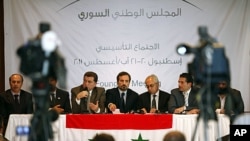Opponents of Syrian President Bashar al-Assad have formed a "national council" that they say will coordinate efforts to oust the embattled leader.
Activists meeting in Turkey announced the group's formation on Tuesday, but they provided few details on the group's make-up.
Meanwhile, U.S. Ambassador Robert Ford has made a surprise visit to the Syrian town of Jassem, where security forces have carried out several deadly crackdowns on dissent.
Ford traveled to the town in the Dara'a region on Tuesday.
The visit comes a month after Ford and French ambassador Eric Chevallier angered Syrian officials by visiting the flashpoint city of Hama. The move prompted the Syrian government to impose travel restrictions on the two envoys.
The Associated Press says Ford received permission from Syria to make Tuesday's trip.
Earlier Tuesday, the U.N. Human Rights Council approved a resolution that calls for an investigation into possible rights violations committed by Syrian security forces. The council's action comes one day after witnesses and rights groups said Syrian forces killed eight people as hundreds of protesters rallied against President Assad.
The witnesses said several hundred people converged on the main square in the central city of Homs on Monday when a U.N. humanitarian team visited the town. Pro-government troops fired on the protesters, many of whom had shouted "Gadhafi is gone; now it is your turn, Bashar!" Six people were reported killed.
Two more people were killed on Monday in anti-government protests in other cities.
Earlier Monday, the U.N. human rights commissioner Navi Pillay said the Syrian government has resorted to an apparent "shoot-to-kill" policy against civilians. She told the U.N. Human Rights Council that more than 2,200 people have been killed in the unrest.
Also Monday, U.N. Secretary-General Ban Ki-moon said it is "troubling" that Assad has not kept his word about ending the military crackdown in his country.
The United States, the European Union and other Western powers have said that Assad must step down.
Assad has defended his crackdown by describing the opposition as armed gangs and terrorists. He also said criticism from Western countries means nothing to him.
The Syrian leader repeated plans to introduce reforms, adding that he expects new elections for Syria's national assembly in six months. He said that laws on the establishment of new political parties will be ready in the next few days, and that people who want to create a new party will have a 45-day period to apply through a committee.
Some information for this report was provided by AP, AFP and Reuters.




